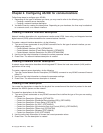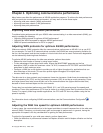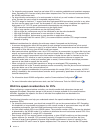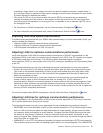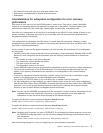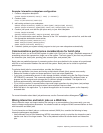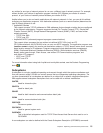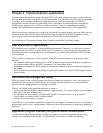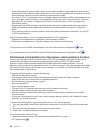
Example: Interactive subsystem configuration
1. Create a subsystem description:
CRTSBSD SBSD(MYLIB/MYINTER) POOLS((1 *BASE) (2 *INTERACT))
2. Create a class
CRTCLS CLS(MYLIB/MYCLASS) RUNPTY(20)
3. add routing entries to your subsystem:
ADDRTGE SBSD(MYLIB/MYINTER) SEQNBR(10) CMPVAL(QCMDI) PGM(QSYS/QCMD) POOLID(2)
ADDRTGE SBSD(MYLIB/MYINTER) SEQNBR(9999) CMPVAL(*ANY) PGM(QSYS/QCMD) POOLID(2)
4. Create a job queue, and add the job queue entry to your new subsystem:
CRTJOBQ JOBQ(MYLIB/MYJOBQ)
ADDJOBQE SBSD(MYLIB/MYINTER) JOBQ(MYLIB/MYJOBQ) MAXACT(200)
5. Set up the workstation name entries. Remove all the *ALL workstation type entries first, and then add
the appropriate workstation name entries:
RMVWSE SBSD(QSYS/QINTER) WRKSTNTYPE(*ALL)
ADDWSE SBSD(QSYS/QINTER) WRKSTN(QPADEV*)
ADDWSE SBSD(MYLIB/MYINTER) WRKSTN(PC*)
6. If desired, update your system startup program to start your new subsystems automatically.
Communications performance considerations for batch jobs
Each piece of work run on the AS/400 system is called a job. Each job is a single, identifiable sequence of
processing actions that represents a single use of the system. The basic types of jobs that are performed
are interactive jobs, batch jobs, spooling jobs, autostart jobs, and prestart jobs.
Batch jobs are predefined groups of processing actions that are submitted to the system to be performed
with little or no interaction between the user and the system. Batch jobs can be tuned for optimized
performance.
To optimize batch jobs for communications, consider the following:
v Break the application into pieces and having multiple batch threads (jobs) operate concurrently.
v Reduce the number of open and close operations, input and output operations.
v If you have a considerable amount of main storage available, consider using the Set Object Access
(SETOBJACC) command. This command preloads the complete database file, database index, or
program into the assigned main storage pool if sufficient storage is available. The objective is to
improve performance by eliminating disk-read/write operations.
v Try to limit the number of communications input and output operations by doing fewer (and perhaps
larger) application sends and receives when communications lines are used.
v Block the data in the application. Try to place the application on the same system as the frequently
accessed data.
For more information about batch job performance, see the Communications Management
book.
Mixing interactive and batch jobs on a WAN line
When interactive users and large transfers are running on a communications line concurrently, you may
need to change configuration parameters. You should be able to configure AS/400 communications to work
with interactive and batch jobs.
To mix interactive and batch jobs on a wide area network (WAN) line, consider the following to keep
interactive performance acceptable:
v Use Advanced Peer-to-Peer Networking (APPN) transmission priority to prioritize the interactive user’s
transfer over that of the large transfer. This is the preferred method to transfer batch and interactive
jobs.
Chapter 3. Optimizing communications performance 13



